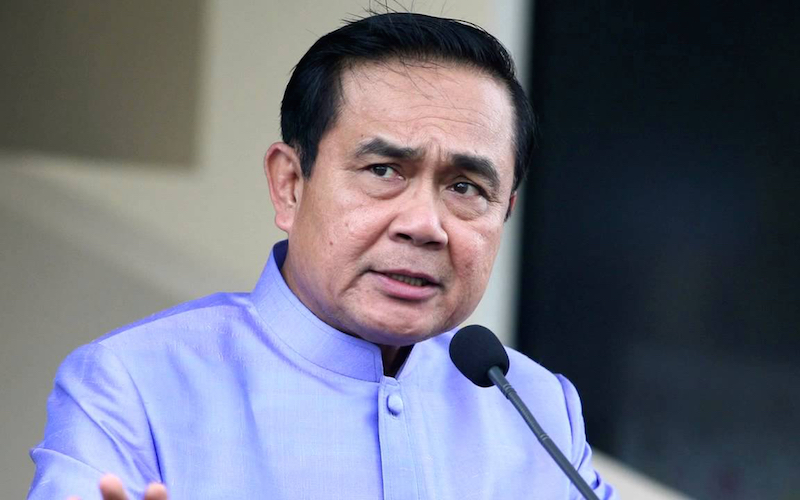
Attitude Adjustment: The Erosion of Human Rights in Thailand
The situation in Thailand is starting to feel a little Orwellian. The temporary caretaker government installed by virtue of a May 2014 coup is beginning to take on a permanent feel.
It has been seventeen months since the elected government was overthrown, and there has been no real indication that power will be relinquished anytime soon. The Thai people, accustomed as they are to military coups (close to twenty since the 1930s), are no doubt inured to the dangers of interim governments and the inherent and insidious erosion of human rights that accompany them. The Thai people may very well regard this as politics as usual in their little corner of South East Asia, and could be forgiven for their myopia. According to Freedom House, Thailand saw the biggest decline in political freedom in the world last year, more than Libya, Sudan and Egypt.
The proffered draft constitution has been rejected by General-turned-Prime Minister Prayuth Chan-ocha and his National Council for Peace and Order (NCPO), pushing back elections for a third time. Their promise was to get life back to a semblance of normalcy in short order, with elections to be held in September of last year. Three postponements later, the junta is now promising to hold elections in 20 months – presumably to give enough time to a new drafting committee to come up with a new constitution, which will then be submitted to public debate before a national referendum.
The reasons for rejecting the draft are varied and not overly clear. Suffice it to say that, ostensibly, the reason seems to be holding on to power.
And although the NCPO organization moniker may sound very much like some garden variety NGO, it is, in effect, a political party. And this party does not take criticism well. Should citizens cross them by word, thought, or deed, they can expect to be rounded up and taken for an “attitude adjustment” by Prayuth’s henchmen.
Journalist and detainee, Pravit Rojanaphruk, tells of how his interrogator likened his arrest and release to being issued a yellow card in a soccer match. It is a warning, not an expulsion from the game. He was picked up for tweeting and posting comments critical of Prayuth and was kept in a 4 meter by 4 meter windowless cell in horrendous conditions for three days before being released. His ‘adjustment’ included threats of being charged with sedition (carrying a seven year jail sentence) and lengthy interrogations. After his release Pravit resigned from his job with The Nation where he had worked as a journalist for twenty-four years. Prayuth and company must have been quite pleased with the result of that particular attitude adjustment. Journalists may be the easier targets when it comes to silencing dissenters.
It can be imagined that social media presents a whole other challenge. A former politician in the overthrown government, Pichai Naripthaphan has been keeping his readers informed as to his several visits to attitude adjustment sessions. His last detention caused a bit of a stir as he was held incommunicado and for a brief period his whereabouts were unknown and he had disappeared from public view. Human Rights Watch called for the NCPO to disclose his whereabouts. He resurfaced a week later.
Students and the general public are also being “adjusted.” In October, a class of 53 film students was put through three days of military boot camp after videos surfaced online showing half a dozen fully clothed students doing an erotic couples dance. Asked who else might be arrested, Prayuth told reporters that “everyone whose comments cause division” was a potential target. Sounds very much like a throwback to the former Soviet Union or modern day life in the People’s Republic of China, doesn’t it? Or the years after the fall of Saigon in Vietnam. The names may differ – attitude adjustment, re-education camps, but the result is the same. The overall point is that citizens who do not toe the line can expect to attract the attention of Prayuth’s goons and be subjected to some sort of behavior modification.
The rest of the world has stood idly by and done little, other than provide rhetoric to the limited discussion. Meanwhile, little by little, human rights are being eroded, violated and dispensed with from Bangkok to the jungle. By today’s standards, when measured against recent incidents of genocide, ethnic cleansing and religious wars with their resulting refugee exodus, a little attitude adjustment may seem innocuous. But it should be borne in mind, that throughout history all such atrocities began quietly.
It is apparent that Prayuth’s actions are those of a leader who fears that negative comments will invite a close examination of his motives and plans. This may be the reason that reports of the “adjustment venues” have varied from almost luxurious to a little on the tough side.
The rejection of the draft constitution, widely seen as an anti-democratic document, could have been reason for celebration. A new document could have been a new chance for the junta to set the record straight and show the world they are nothing like Myanmar’s generals. However, all that seems squandered now, as the government steps up its attitude adjustment programs and crackdowns harder on dissent, rendering the next 20 months ostensibly dedicated to public debates a sad joke. Unless something is done, either from outside the country, but preferably from within, human rights will continues to evaporate in modern day Thailand. The world seems to have little political will to weigh in on this travesty in any meaningful and tangible manner.

